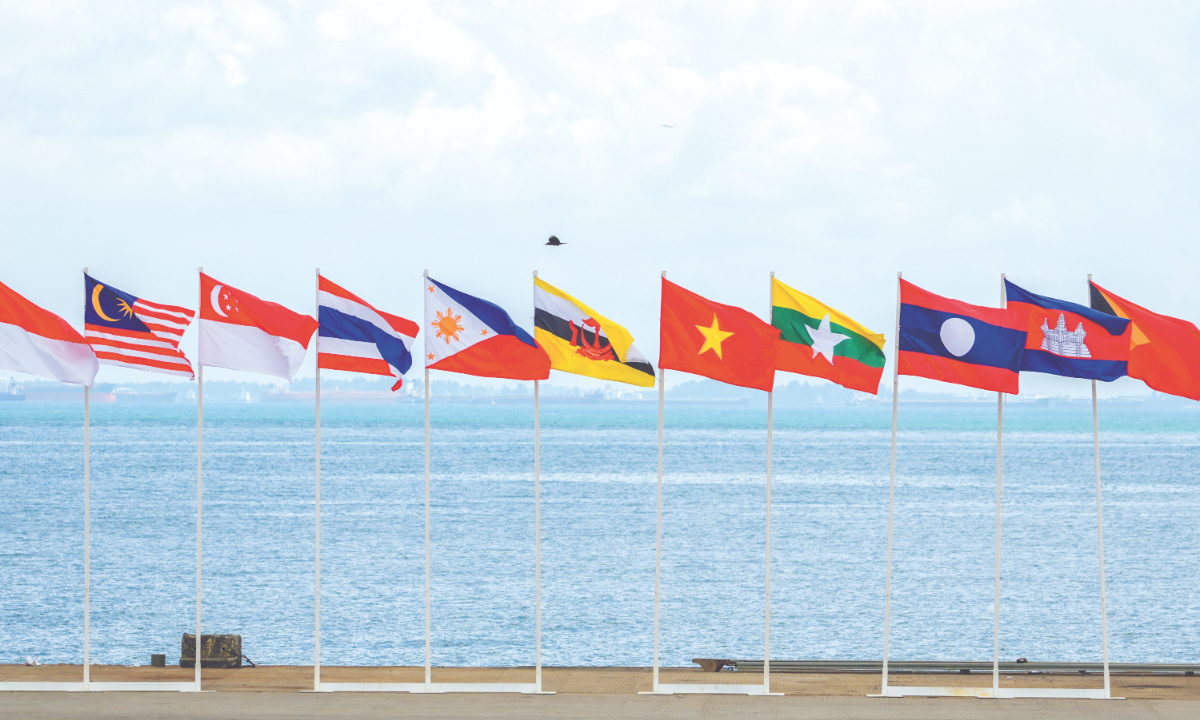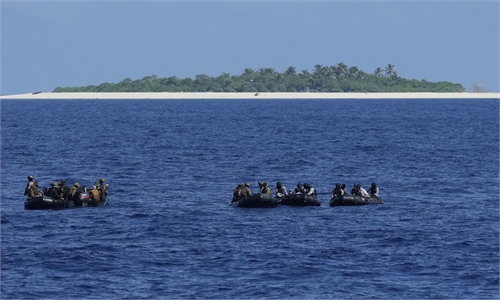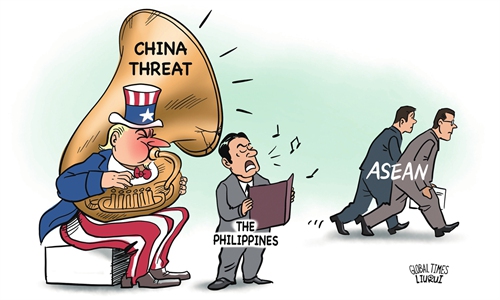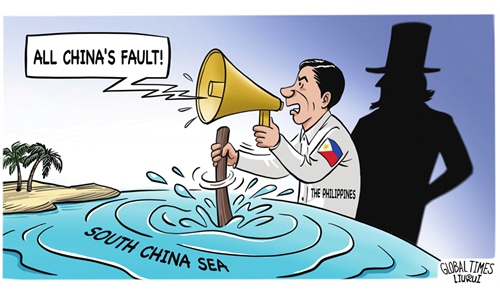
The flags of ASEAN member states are displayed at a naval base during the ASEAN Solidarity Exercise Natuna in Batam, Indonesia on September 20, 2023 Photo: AFP
Editor's Note:
The escalation of recent tensions between China and the Philippines raises concerns among neighboring countries in the South China Sea. How will the Philippines' provocations, instigated and supported by the US, affect the situation in the South China Sea? Why does ASEAN hope that the situation will be contained?
In the "ASEAN Perspective on the South China Sea" series, we collect wisdom and insights from former diplomats and scholars from ASEAN member countries. M.Habib Abiyan Dzakwan (Dzakwan), research fellow of Department of International Relations, Centre for Strategic and International Studies, Indonesia, told Global Times (GT) reporters Yu Jincui, Qian Jiayin and Xing Xiaojing that dialogue is the way forward. We cannot afford any confrontations in the region, as they would negatively impact our economy and our people-to-people relations, Dzakwan said.
GT: In your opinion, what is an effective way to resolve the South China Sea issue?
Dzakwan: There have been some heated discussions, but we ultimately agreed that dialogue is the way forward. We cannot afford any confrontations in the region, as they would negatively impact our economy and our people-to-people relations. Therefore, the South China Sea issue needs to be resolved peacefully through the existing platforms we already have.
For example, ASEAN and China should focus on expediting the conclusion of the Code of Conduct. It is crucial for ASEAN and China to establish norms and move beyond the disagreements between the Philippines and China.
GT: As the competition between China and the US intensifies, Southeast Asia is increasingly becoming a focal point for the US in its rivalry with China. Do you think the US can rally Indonesia and other ASEAN countries to stand with it against China?
Dzakwan: First things first, Indonesia and other ASEAN countries have individual agency. We cannot be dictated to by any foreign country, whether it be the US or China. We definitely believe in our own national interests. Any attempt to push us to one side will not succeed because, for us in the region, we always aspire to achieve the best and the greater good for everyone, even if it doesn't satisfy everyone. At the very least, we arrive at a similar conclusion: It is better for us to work with everyone, as the world is simply too large to be dominated by a single party. Therefore, we must collaborate to address our global challenges.
GT: Just as you said, most ASEAN countries don't want to take sides between China and the US. Noticeably, earlier this year, an interesting survey report from a Singapore think tank showed that more than half of the people in Southeast Asia would side with China over the US, if forced to choose. Why do you think this trend is emerging?
Dzakwan: I think the survey doesn't necessarily represent the whole community, right? There may be a certain lack of representation, and whether the sample size is sufficient to represent the whole population is another question. But I totally agree with the sentiment that some ASEAN countries are seeing or appreciating their cooperation with China more. I guess there are several reasons for that.
One reason is definitely that China has always been present in ASEAN and ASEAN-related meetings. Second, China puts its money where its mouth is. China walks the talk when it says that Southeast Asia is important; it invests significantly in the region. The largest beneficiaries of the Belt and Road Initiative are definitely in Southeast Asia.
And the third reason is that China doesn't necessarily position itself on a higher moral ground by dictating issues related to human rights or posturing on environmental matters or the Palestine-Israel issue. China respects the boundaries set by ASEAN, I suppose.
GT: After Donald Trump assumes office, do you think the US will pay more attention to the ASEAN and South Asian regions?
Dzakwan: I am doubtful about that. I don't think the US under Trump's presidency will pay much attention to Southeast Asian countries, except perhaps in the context of its competition with China. Any attention given to Southeast Asian nations is likely to be viewed through the lens of US-China competition, rather than appreciating the individual strengths and potentials of each ASEAN member state.
GT: ASEAN countries like Indonesia, Sri Lanka and Malaysia have expressed their desire to join BRICS. Why are more and more Southeast Asian countries gravitating toward BRICS? What larger trend does this reflect?
Dzakwan: The trend moving forward is that developing countries are demanding more representation in global governance. They also seek a faster decision-making process within existing international institutions. This is where BRICS stands out, as it is less institutionalized compared to older organizations like the Bretton Woods institutions. As a result, BRICS can facilitate quicker and broader cooperation. Importantly, many of these countries do not view BRICS as a geopolitical bloc; rather, they see it as an additional platform to advance their interests.
GT: Both Indonesia and China have large fishery industries and numerous fishermen, and there are overlapping areas of fishery resource development in the South China Sea and other maritime regions. In your opinion, what kind of cooperation can the two sides undertake to jointly and reasonably develop and manage fishery resources while protecting the marine ecological environment?
Dzakwan: First, I believe China has been doing very well in terms of environmental safeguards across many industries. For example, Beijing has transformed from one of the most polluted cities in the past to one of the cleaner cities today, particularly regarding air quality.
Therefore, I think we can learn a lot from China about how to develop and enforce environmental safeguards for industries, including the blue economy and fisheries. We know that the fishery industry can also contaminate or pollute waters, but I believe China can share best practices regarding sustainable practices. Secondly, we can share technology which plays a crucial role in processing raw materials into seafood products.
GT: What are your expectations for future China-Indonesia relations and China-ASEAN relations?
Dzakwan: For Indonesia and China, ASEAN and China, as well as their relations, I am very optimistic about the future. I see a complementarity in the way both sides view each other. For example, ASEAN countries definitely need sources of investment, and China can offer that. China, in turn, needs overseas destinations to invest its money.
Additionally, ASEAN needs markets, and China represents a significant and emerging economy that can serve as a market for ASEAN countries. This perspective is very compatible with our goals. We still adhere to the principles of an inclusive and open economy in the region, and we want the region to be more prosperous.
GT: The APEC and G20 meetings have concluded in November, and the Global South has taken the spotlight. International media has been suggesting that the world is moving toward multipolarity, no longer dominated by the West in the international order. How do you think the West should perceive this shift?
Dzakwan: Developing countries want more options. We do not want to displace the US because we think that the US is also indispensable to the institutions that ensure global stability. We still need the West to safeguard that kind of international stability. At the same time, we see the merits of increasing representation and channeling more voices from the Global South at the global level, especially with regard to China's rise. I believe that China's contributions to global public goods are also indispensable and should be respected.
China and the US should work together; otherwise, the impacts will be felt by smaller countries and middle powers, like Indonesia and ASEAN countries. What we aspire to is a more balanced approach. We need to restore the inclusive approach that we had in the past.



